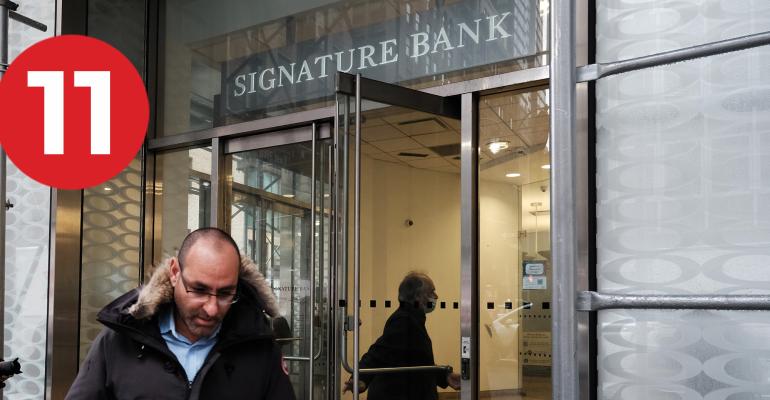- Real-Estate Investor Run on Signature Bank Helped Fuel Its Demise “A rush by New York City real-estate investors to yank money out of Signature Bank last week played a significant role in the bank’s collapse, according to building owners and state regulators. The withdrawals gained momentum as talk circulated about the exposure Signature had to cryptocurrency firms and that its fate might follow the same path as Silicon Valley Bank, which suffered a run on the bank last week before collapsing and forcing the government to step in.” (The Wall Street Journal)
- Short sellers are betting against SL Green “The rise in SL Green’s short interest comes as its share price has plummeted 65 percent in the past year, closing Tuesday at an even $28. It was trading at around $80 this time last year, and it started 2023 above $34.” (The Real Deal)
- Amid U.S. Banking Crisis, CRE Has Interest Rate Hikes Top Of Mind “CBRE is still predicting a quarter-point increase at the next FOMC meeting. Recent stress in the banking system will complicate the Fed’s balancing of risks as it sets policy, the company said in a report on Tuesday, but it predicts that the central bank is going to nevertheless pull the trigger on an increase.” (Bisnow)
- Senior Housing Recovers — Slowly — From the Pandemic “Roughly 150 of them shuttered in 2022, as conditions exacerbated by nearly three years of the pandemic caught up with operators. A further 307 closed in 2020 and 2021, other pandemic years.” (Commercial Observer)
- 3 Tax Planning Opportunities CRE Execs Don’t Want to Miss “While the provisions of carried interest remain unchanged, the originally-proposed modifications are important to note—and consider for addressing—ahead of future legislative packages and shifting industry trends.” (Commercial Property Executive)
- The Ten Scariest Sentences You’ll Hear in a CRE Deal “Here’s one: This is a one-of-a-kind asset that will always keep its value.” (GlobeSt.com)
- Real Estate ETFs Up as Investors Anticipate Fed Easing on Interest Rates “The first day of trading the week after the second and third largest bank collapses in U.S. history saw the Real Estate Select Sector SPDR Fund (XLRE) outperform all the other funds in the Select Sector SPDR family. The fund was up 1.6%.” (ETF.com)
- NY multifamily fears bank contagion “As the dust settles, attorneys and owners agree that the immediate hit to New York real estate from Signature’s collapse is minimal. The greater fear is whether one bank’s failure could drive a run on its regional competitors, their liquidity, and ultimately, their ability to lend.” (The Real Deal)
- U.S. Approves $31 Billion Merger of Two Big Railroads “Under the merger plan, Canadian Pacific, the sixth-largest freight railroad by revenue operating in the United States, agreed to buy the next-largest carrier, Kansas City Southern. The combined railroad will not overtake the fifth-largest carrier, Canadian National.” (The New York Times)
- Homebuilders say demand is rising, but they’re concerned about banking fallout “A monthly gauge of builder confidence in the market for newly built single-family homes rose in March, even though analysts expected a drop. The National Association of Home Builders/Wells Fargo Housing Market Index rose two points to 44. Anything above 50 is considered positive.” (CNBC)
- Your groceries will get stocked by robots and delivered by self-driving trucks “The self-driving trucks will operate out of a new $55 million fulfillment center, sending customer orders to various retail locations several times a day, speeding up the rate at which online orders are ready—and, since they originate from a warehouse and not a smaller store, reducing the chances of an item being out of stock (if you shop with Kroger).” (Forbes)
0 comments
Hide comments





